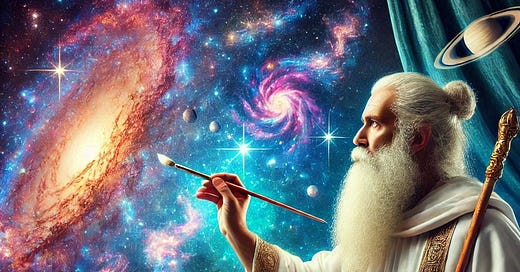The debate over God’s existence starts to look very different once you take on board the following insight:
We should not expect a perfect being to create the best possible world (or universe), but rather the best possible multiverse.
Crucially, we should not expect the best possible multiverse to just be a single (utopian) universe. After all, if there’s one thing we know about population ethics, it’s that the average view is false. So, just as below-average lives can still be worth living and worth adding to the world, so we should expect that a below-average universe could still be objectively “worth” existing, or worth creating from a perfect being’s perspective. In general, we should expect—with the disjunction of the total view or a critical range view—that the best possible multiverse will contain every universe that is overall (sufficiently) good.
This completely defangs the Problem of Evil:
Why did God create our imperfect world? Because it’s sufficiently good overall: better for it to exist than not to.
But why didn’t God create a better world? He did! You just can’t see it from here. But describe a utopian universe, w1, and theists should believe that w1 exists.
Why aren’t I in that better world? Why aren’t you me? It’s a nonsense question. Everyone is who they are and not another person. ‘I’ picks out the person having that thought, and there’s a person having that thought in this world, so there it is. In another world, another person’s indexicals pick out them. There’s nothing more to it.
What reason do we have to believe that w1 exists? Just whatever reason you have to believe that a perfect God exists. (I don’t see much reason to believe that, but theists obviously disagree.) The key point is that simply observing all the ways that our world falls short of w1 provides no reason at all to think that w1 doesn’t exist in addition. On its face, our world is just irrelevant to that question. Unless our world is so bad that its existence would positively detract from the multiverse (and I don’t believe that), nothing we observe will be inconsistent with our being part of the best possible multiverse, which is what we should expect a perfect being to create.
But it also utterly undermines arguments from (e.g. psychophysical) harmony:
Even wacky, radically disharmonious, incomprehensible worlds could still be “sufficiently good” overall to be included in the best possible multiverse.
So God’s existence does not especially predict that an arbitrary observer is likely to find themselves in a harmonious, comprehensible world.
So observing such harmony gives us no special reason to expect that we’re in a world that God selected. He’s a much more indiscriminate cad than you realized!
Below the paywall, I’ll explain: (1) how this actually creates a powerful argument from psychophysical harmony against God’s existence; (2) why the multiverse theodicy is better than Matthew’s indifference theodicy; (3) why I’m not convinced by Bradley Monton’s objections Against Multiverse Theodicies; and (4) why it would nonetheless be extremely disturbing (and morally undermining) if all this were true.
Keep reading with a 7-day free trial
Subscribe to Good Thoughts to keep reading this post and get 7 days of free access to the full post archives.




